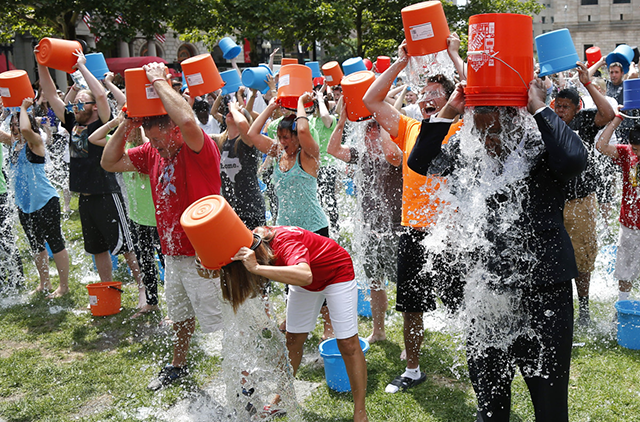You can’t go an hour without seeing an online video one of your friends, a major celebrity or a tech titan dump a bucket of ice water on their heads posted on social networking sites.
If you’ve seen one of the 1.2 million ice bucket challenge videos uploaded to Facebook alone, you know the movement aims to raise awareness for ALS, the neurodegenerative disease also known as Lou Gehrig’s Disease.
But according to new Facebook data, the ice bucket challenge quietly started as far back as June 8, nearly six weeks before it was tied to ALS in July and eventually reached viral status this week.
For those unfamiliar with the trend, the concept is easy: Grab a bucket of ice water, pour it over your head and have someone film the whole thing. Post the clip to Facebook or Twitter and then challenge a few people (even celebrities) to do the same within 24 hours, or make a $100 donation to charity. Of course, the idea is to do both.
The ALS Association has raised $7.6 million in donations in just two weeks, up from $1.4 million raised in the same period last year, according to The Wall Street Journal.
It’s become this summer’s version of the “Harlem Shake” or “Call Me Maybe” video parodies, but for a good cause. It’s become this summer’s version of the “Harlem Shake” or “Call Me Maybe” video parodies, but for a good cause.
While “Today” show anchor Matt Lauer was one of the first to bring the ice bucket challenge to the mainstream on July 15 during a live broadcast, it wasn’t until golfer Chris Kennedy participated too and challenged his cousin Jeanette Senerchia of Pelham, New York to film her own video — her husband is battling is ALS.
“I was called out by a friend who had picked a different charity — the purpose of the challenge was to pick a charity that was personally significant to you,” Kennedy told Mashable. “When I challenged my friends and Jeanette, the charity of my choice was the ALS Foundation. Family and friends eventually rallied behind them and it spread like crazy.”
From there, it made its way to 31-year-old ALS patient Pat Quinn from Yonkers, New York, and later former Boston College baseball player Pete Frates, who was diagnosed with ALS in 2012. When it finally reached Frates’ social network, the challenge went viral. This explains how Boston became instrumental in spreading it to other parts of the country.
source:mashable








